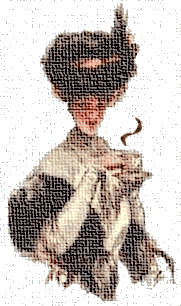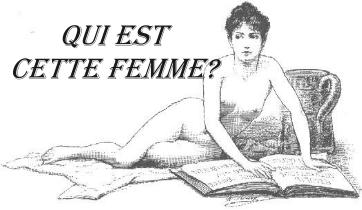Eugénie gave her blessing to the idea of the marriage.
 "I heartily approve," she said to Philo when he told her over tea at the Hotel Continental the following day. "It may be the smartest thing you've done for yourself in forty years. You've given to everyone but yourself. Now let this darling girl give some of it back. Why do you think I surround myself with young people? As a tonic!
"This is simply a mariage de convenance, the kind of marriage for convenience that we Europeans understand. Most of us marry that way. We are matched to protect titles or fortunes, or to unite families of equal rank. Few of us marry for love, as you Americans do. Of course, I was an exception. My husband broke all the rules when he married me. Ours was a love match.
"All who are acquainted with you understand that you are not an old fool. All acquainted with Romelle understand her as an accomplished artist who knows her own mind. Everyone, absolutely everyone, will approve!"
"Thank you, Madame," Philo commented gratefully.
"When will you marry?"
"Quite soon, I think," he replied. "Having reached the decision, it behooves us to make it a fait accompli. Later today, I shall explain to her the intricacies of Dragon's Heart."
Eugénie sighed. "Oh, I pray the mystery of Dragon's Heart will be resolved in my lifetime. I so want to know!"
She called for more tea with a shake of a crystal table bell.
"Captain, may I make an offer concerning the marriage?"
"Of course, Madame."
The waiter brought the tea. She poured for Philo and herself.
"I shall be returning to the villa at Cap Martin for the remainder of the season," she proceeded. "I find that with the passing of the years, the English winters are simply too harsh for my comfort. I offer you Villa Cyrnos for the ceremony. I would love to have you down there. It may provide you with an element of privacy you will not find in Paris."
Overwhelmed by her generosity, Philo accepted on the contingency that it did not interfere with anything Romelle had in mind.
Romelle approved it gladly, adding that she would like the marriage to take place six weeks later, on Saint Valentine's Day, the fourteenth of February.
A flooding of the Seine had devastated central Paris the year before. Icy water overflowed to the depth of a meter in several streets on both sides of the river. Parts of the city resembled Venice. The Trocadéro, where Annie and Pierre sang during the Revolutionary Centennial more than twenty years before, was compared to an Indian temple lapped by the Ganges.
In the Place Dauphine, water had inundated the wine cellar. Philo instructed a houseman to dive from the top of the basement stairs to save a case of Pommery 1904 presented him as a gift by the Empress. In gratitude, Philo gave the houseman a bottle of impeccable sauterne. Accepting the expensive wine with no more than a nod, the surly fellow felt cheated that he had not been awarded a bottle of the priceless champagne he had reclaimed. A year had passed, but still the imagined wound festered.
A second incident conspired with this earlier one to create an explosive situation.
It began the night Picasso opened a showing of recent works two weeks before the wedding. The centerpiece was The Golden Parisienne. During the opening reception, a gang of thugs marched into the gallery, menaced everyone with guns, and walked out with half a dozen paintings, including the centerpiece.
Quickly apprehended, the "thieves" turned out to be starving artists hired by the gallery as a stunt to call public attention to the exhibition. Picasso was furious and demanded the return of his paintings. Despite his offended sensibilities, the ruse worked. The canvases stayed on display, and the show was what one critic called a succès fou, a "wild success."
The hit of the exhibit proved to be The Golden Parisienne. Picasso refused to identify the model, but an enterprising reporter for a scandal sheet paid one of the "thieves," a man bitterly jealous of Picasso's talent, to really steal the Spaniard's portfolio of preliminary studies for the painting.
The first of the series of twelve sketches was not abstract; it was easily recognizable as Romelle.
She had consented to pose in a nightgown of clinging satin. The pillaging artist had no difficulty, therefore, imagining her in the nude. A fine copyist, he recreated the sketch brilliantly, taking license to show her unclad. "I heartily approve," she said to Philo when he told her over tea at the Hotel Continental the following day. "It may be the smartest thing you've done for yourself in forty years. You've given to everyone but yourself. Now let this darling girl give some of it back. Why do you think I surround myself with young people? As a tonic!
"This is simply a mariage de convenance, the kind of marriage for convenience that we Europeans understand. Most of us marry that way. We are matched to protect titles or fortunes, or to unite families of equal rank. Few of us marry for love, as you Americans do. Of course, I was an exception. My husband broke all the rules when he married me. Ours was a love match.
"All who are acquainted with you understand that you are not an old fool. All acquainted with Romelle understand her as an accomplished artist who knows her own mind. Everyone, absolutely everyone, will approve!"
"Thank you, Madame," Philo commented gratefully.
"When will you marry?"
"Quite soon, I think," he replied. "Having reached the decision, it behooves us to make it a fait accompli. Later today, I shall explain to her the intricacies of Dragon's Heart."
Eugénie sighed. "Oh, I pray the mystery of Dragon's Heart will be resolved in my lifetime. I so want to know!"
She called for more tea with a shake of a crystal table bell.
"Captain, may I make an offer concerning the marriage?"
"Of course, Madame."
The waiter brought the tea. She poured for Philo and herself.
"I shall be returning to the villa at Cap Martin for the remainder of the season," she proceeded. "I find that with the passing of the years, the English winters are simply too harsh for my comfort. I offer you Villa Cyrnos for the ceremony. I would love to have you down there. It may provide you with an element of privacy you will not find in Paris."
Overwhelmed by her generosity, Philo accepted on the contingency that it did not interfere with anything Romelle had in mind.
Romelle approved it gladly, adding that she would like the marriage to take place six weeks later, on Saint Valentine's Day, the fourteenth of February.
A flooding of the Seine had devastated central Paris the year before. Icy water overflowed to the depth of a meter in several streets on both sides of the river. Parts of the city resembled Venice. The Trocadéro, where Annie and Pierre sang during the Revolutionary Centennial more than twenty years before, was compared to an Indian temple lapped by the Ganges.
In the Place Dauphine, water had inundated the wine cellar. Philo instructed a houseman to dive from the top of the basement stairs to save a case of Pommery 1904 presented him as a gift by the Empress. In gratitude, Philo gave the houseman a bottle of impeccable sauterne. Accepting the expensive wine with no more than a nod, the surly fellow felt cheated that he had not been awarded a bottle of the priceless champagne he had reclaimed. A year had passed, but still the imagined wound festered.
A second incident conspired with this earlier one to create an explosive situation.
It began the night Picasso opened a showing of recent works two weeks before the wedding. The centerpiece was The Golden Parisienne. During the opening reception, a gang of thugs marched into the gallery, menaced everyone with guns, and walked out with half a dozen paintings, including the centerpiece.
Quickly apprehended, the "thieves" turned out to be starving artists hired by the gallery as a stunt to call public attention to the exhibition. Picasso was furious and demanded the return of his paintings. Despite his offended sensibilities, the ruse worked. The canvases stayed on display, and the show was what one critic called a succès fou, a "wild success."
The hit of the exhibit proved to be The Golden Parisienne. Picasso refused to identify the model, but an enterprising reporter for a scandal sheet paid one of the "thieves," a man bitterly jealous of Picasso's talent, to really steal the Spaniard's portfolio of preliminary studies for the painting.
The first of the series of twelve sketches was not abstract; it was easily recognizable as Romelle.
She had consented to pose in a nightgown of clinging satin. The pillaging artist had no difficulty, therefore, imagining her in the nude. A fine copyist, he recreated the sketch brilliantly, taking license to show her unclad.
 |



